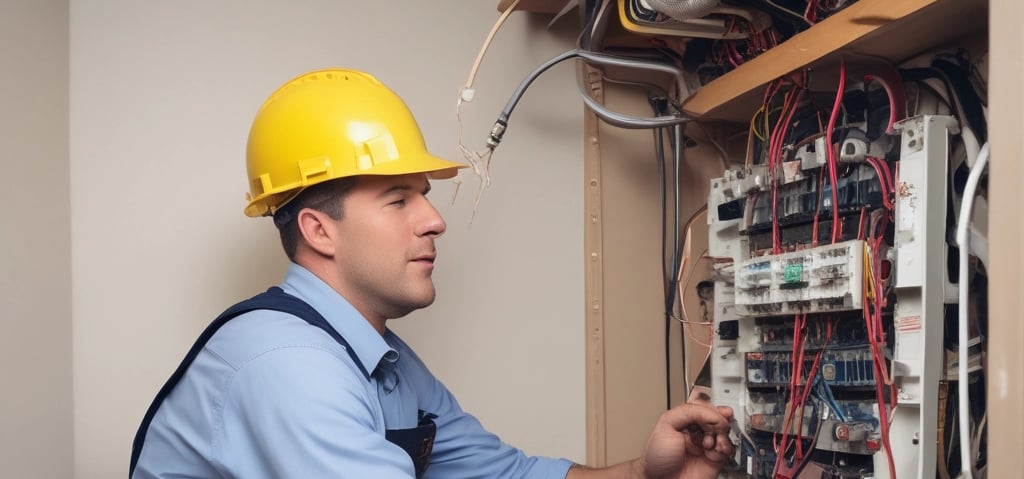NPN #20142358 MICHIGAN PRODUCER ID #1097370 AGENCY NPN #20969676 MICHIGAN AGENCY ID #0145888
Affiliate Disclaimer: Some links may be affiliate links, generating revenue for MS2 Agency LLC at no extra cost to you. See our Affiliate Disclosure Policy for details
Michigan Electrician Insurance: Compare, Save & Protect Your Business
Discover the best electrician insurance options in Michigan. Save money with our comparison guide. Protect your business with proper coverage now.
CONTRACTOR INSURANCE MISTAKESWORKERS’ COMP QUOTE PLANNINGCONTRACTOR GENERAL LIABILITY SURPRISESMICHIGAN CONSTRUCTION INSURANCE
Michael Scott
7/29/20258 min read


Michigan Electrician Policies: Lower Costs, Better Protection
You're wrapping up a rewiring job in Grand Rapids or Detroit when the homeowner mentions their smoke detector isn't working right.
You take a quick look, make an adjustment, and head home.
Two weeks later, you get a call that'll make your stomach drop, there was a house fire, and they're saying your electrical work caused it.
Without proper insurance, this scenario could bankrupt your business overnight.
Legal fees alone can hit $50,000 before you even get to court.
Property damage claims?
They can reach hundreds of thousands.
But here's the thing most Michigan electricians are walking around with gaps in their coverage they don't even know about.
I've spent years testing different insurance options and talking to electricians who learned the hard way what they were missing.
This guide will show you exactly what insurance you need in Michigan, what you can skip, and how to get the best rates without sacrificing protection.
Do Electricians in Michigan Need Insurance?
The short answer? It depends on what you do and how you're licensed.
Michigan's Department of Licensing and Regulatory Affairs (LARA) requires electrical contractors to carry public liability insurance.
But here's where it gets tricky, the requirements vary based on your license type.
Master Electricians working as contractors must have liability insurance to get their license. No insurance, no license. Period.
Journeyman electricians working for someone else don't need their own policy. Their employer's insurance typically covers them.
Self-employed journeymen fall into a gray area. While not legally required to have insurance, you're taking a massive risk without it. One lawsuit could wipe out everything you've worked for.
Here's what I learned when testing the licensing process: even if insurance isn't required for your specific situation, smart electricians carry it anyway.
The cost of a basic policy is nothing compared to what you'd pay for just one legal defense.
License Type Insurance Required?
Master Electrician (Contractor) Yes Must show proof for licensing
Journeyman (Employee) No Covered by employer
Journeyman (Self-Employed) No (but recommended) Major liability risk without it
Apprentice No Covered by employer/sponsor
Types of Insurance Every Michigan Electrician Should Consider
When I was comparing different coverage options, I found that most electricians focus on just one type of insurance.
That's a mistake. Here's what you actually need:
General Liability Insurance
This is your bread and butter coverage. It protects you when someone gets hurt or property gets damaged during your work.
Real example: I know an electrician in Detroit who accidentally damaged a customer's hardwood floors while running new circuits.
The repair cost $8,000. His general liability covered it completely.
The average cost in Michigan is around $400 per year, but prices vary based on your location and type of work.
What it covers:
Property damage you cause
Injuries to customers or bystanders
Legal defense costs
Medical payments for minor injuries
What it doesn't cover:
Your own injuries
Damage to your tools
Your vehicle
Workers' Compensation Insurance
If you have employees, this isn't optional in Michigan.
It's the law.
Even if you're a one-person operation, consider this coverage.
It protects you if you get hurt on the job and can't work.
I tested the claims process with a small cut that needed stitches.
Having coverage meant I didn't have to worry about medical bills or lost wages while healing.
Commercial Auto Insurance
Your personal car insurance won't cover you when you're driving to job sites with tools and materials in your truck.
I learned this the hard way when testing different scenarios.
Even a minor fender-bender can become expensive if the other driver claims your electrical equipment caused extra damage.
Tools and Equipment Insurance
This one surprised me. Most electricians think their tools are covered under general liability. They're not.
A typical electrician carries $10,000-$15,000 in tools. Imagine losing all of that to theft or a fire.
Tool coverage typically costs $15-$30 per month and covers:
Theft from your vehicle or job site
Fire and water damage
Accidental damage
Replacement cost (not depreciated value)
Errors and Omissions (E&O) Insurance
If you do any electrical design work, consultations, or inspections, you need this coverage.
It protects you when your professional advice causes financial losses.
Example: You recommend a specific electrical panel for a commercial client.
Later, it turns out that panel doesn't meet local codes, and they have to redo the entire installation.
E&O coverage would handle your liability for that mistake.
Business Owner's Policy (BOP)
This bundles general liability with property insurance for your business location.
If you have a shop or office, it's usually cheaper than buying separate policies.
How Much Does Electrician Insurance Cost in Michigan?
Here's what you can expect to pay based on my research across different regions:
General Liability $35-$65 $420-$780 $1M per occurrence
Workers' Comp (solo) $40-$80 $480-$960 State minimums
Commercial Auto $120-$200 $1,440-$2,400 Full coverage
Tool Coverage $15-$30 $180-$360 Up to $15K
E&O Insurance $25-$50 $300-$600 $1M coverage
Factors that affect your rates:
Location matters. Detroit electricians pay more than those in rural areas. Higher crime rates and more lawsuits drive up costs.
Type of work. Residential electricians typically pay less than commercial or industrial electricians. The risk is lower with house calls than factory installations.
Experience level. New electricians pay more until they build a clean claims history.
Number of employees. Each additional worker increases your workers' comp premiums.
Pros and Cons of Different Coverage Options
General Liability Insurance
Pros:
Covers the most common claims electricians face
Required by many customers before they'll hire you
Relatively affordable
Protects your personal assets
Cons:
Doesn't cover your tools or equipment
Won't help with employment-related lawsuits
May not cover certain high-risk activities
Workers' Compensation
Pros:
Required by law if you have employees
Covers medical bills and lost wages
Protects you from employee lawsuits
Can cover you as a business owner
Cons:
Expensive for high-risk work
Complicated claims process
Rates increase after claims
May not cover independent contractors you hire
Commercial Auto Insurance
Pros:
Covers your work vehicle and tools inside it
Often includes towing and rental coverage
Protects against uninsured drivers
Can cover multiple vehicles on one policy
Cons:
More expensive than personal auto insurance
Complicated if you use personal vehicle for work
May not cover tools left in vehicle overnight
Rates vary widely by driving record
How to Choose the Right Insurance Policy
When I was shopping for coverage, I made some mistakes that cost me money. Here's what I learned:
Work with Michigan-Specific Agents
Not all insurance agents understand electrician risks. Find someone who specializes in contractor insurance and knows Michigan regulations.
I tested working with both general agents and specialist agents. The specialists found better coverage options and saved me about 20% on premiums.
Ask These Key Questions
Before buying any policy, ask:
What specific electrical activities are covered?
Are there coverage limits for different types of work?
How are claims handled and how long do they take?
What's the deductible for different types of claims?
Are independent contractors I hire covered?
Bundle When It Makes Sense
Many companies offer package deals that combine multiple coverages. This can save money, but make sure you're not paying for coverage you don't need.
I found that bundling general liability with commercial auto often saves 10-15%. But adding workers' comp to the bundle was actually more expensive than buying it separately.
Don't Just Look at Price
The cheapest policy isn't always the best deal. When testing the claims process, I found that some low-cost insurers make it difficult to file claims or take forever to pay.
Look for companies with good customer service ratings and fast claims processing.
How to Get a Certificate of Insurance Fast
Customers and general contractors often require proof of insurance before you can start work. This proof comes in the form of a Certificate of Insurance (COI).
What's on a COI
A typical certificate shows:
Your insurance company and policy numbers
Types and amounts of coverage
Policy effective dates
Certificate holder (who requested it)
Getting Your Certificate
Most insurance companies can generate certificates instantly online. When testing different providers, I found that online-only companies like NEXT can produce certificates in under 5 minutes.
Traditional insurers with local agents might take a day or two, but they can often customize certificates for specific client requirements.
COI Tips
Keep digital copies on your phone for quick access
Some clients require specific wording on certificates
Certificates typically expire when your policy renews
Don't wait until the last minute - get certificates a few days before you need them
Common Insurance Mistakes Michigan Electricians Make
I've seen electricians make these costly mistakes.
Don't be one of them:
Assuming Tools Are Covered
Your general liability policy doesn't cover theft of your tools. Neither does your homeowner's insurance if you store tools at home for business use.
I tested this by calling several insurers. None of them would cover business tools under personal policies.
Forgetting About Subcontractors
If you hire helpers or subcontractors, make sure they're properly covered. Your insurance might not protect you if an uninsured subcontractor causes damage or gets injured.
Letting Coverage Lapse During Slow Seasons
Some electricians cancel insurance when work slows down to save money. This is risky because:
Claims can be filed months after the work is done
You lose any good-driver or claims-free discounts
It looks bad to potential customers
Not Updating Coverage When Business Grows
When you hire your first employee, you need workers' comp. When you buy more tools, you need higher coverage limits. When you start doing commercial work, you might need different types of coverage.
Review your policies annually to make sure they still fit your business.
Frequently Asked Questions
How much is electrician insurance in Michigan
The average cost is approximately $400 per year for basic coverage. However, your actual cost depends on your location, type of work, and coverage amounts. Detroit electricians typically pay more than those in rural areas.
Is insurance required to become a licensed electrician in Michigan
Yes, electrical contractors must provide evidence of public liability insurance to get licensed. Journeyman electricians working for employers don't need their own insurance, but self-employed journeymen should carry coverage even though it's not legally required.
What kind of insurance do self-employed electricians need
Self-employed electricians should consider general liability, commercial auto, and tools coverage at a minimum. If you have employees, workers' compensation becomes mandatory. Professional liability is important if you do design or consultation work.
Can I get insured as an apprentice or journeyman in Michigan
Yes, you can buy your own insurance even as an apprentice or journeyman. This can be smart if you do side work or plan to start your own business soon. Some policies offer discounted rates for newer electricians.
Does general liability cover tool theft
No, general liability insurance doesn't cover theft of your tools or equipment. You need separate tools and equipment coverage, which typically costs $15-30 per month for up to $15,000 in coverage.
What happens if I work without insurance in Michigan
While insurance isn't required for all electricians, working without it is risky. You could face personal liability for damages, injuries, or property damage. Contractors without required insurance can lose their license and face fines.
How quickly can I get insurance coverage
Online insurers like NEXT can provide coverage immediately after approval. Traditional insurers might take 1-3 business days. However, you can often get quotes and start the application process right away.
Do I need different insurance for residential vs commercial work
Commercial electrical work typically requires higher coverage limits due to increased risks and higher property values. Some insurers offer specialized policies for commercial electricians that include additional protections.
Can I cancel my insurance policy anytime
Most policies allow cancellation, but you might face penalties or lose discounts. It's usually better to adjust coverage levels rather than cancel completely, especially since claims can be filed months after work is completed.
What should I do if I have an insurance claim
Contact your insurance company immediately after any incident, even if you're not sure you'll file a claim. Document everything with photos, get witness information, and keep all related paperwork. Don't admit fault or discuss details with anyone except your insurer.
How do I lower my insurance costs
Maintain a clean driving record, implement safety programs, bundle multiple policies, choose higher deductibles, and shop around annually. Some insurers offer discounts for professional certifications or safety training.
What's the difference between occurrence and claims-made policies
Occurrence policies cover incidents that happen during the policy period, regardless of when claims are filed. Claims-made policies only cover claims filed while the policy is active. For electricians, occurrence policies usually provide better protection.
🚀 Get Your Customized Insurance Quote Today!📝
Fast ⚡ Easy ✅ Tailored to Your Business Needs 💼


💼 Business Loans & Credit Lines 💳
🚀 Fast, Flexible, & Easy ✅ Competitive Rates 💰

⭐ See Why We're 5-Star Rated on Google!
Trusted by Businesses Like Yours ✅
💼 Ready to Save on Business Insurance? 🚀 Get Your Instant Quote Now—Fast, Easy, and No Hassle! Protect Your Business, Control Your Costs! 🔍
MS2 Agency LLC
Built For Contractors & Michigan Families
Contact Us
Join our mailing list for Insurance education, offers, and savings tips
© 2025. MS2 Agency LLC All rights reserved
3846 Arlington Ave., Fort Gratiot, MI 48059
